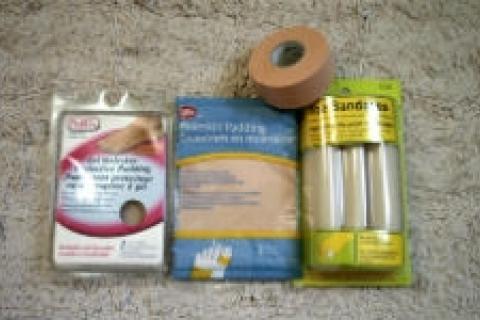
 A few years ago while on a caribou hunt on the tundra of northern Quebec, I nearly had my hunt ruined by blisters on my feet. Thanks to some immediate attention to the problem, I was able to continue and have a successful hunt. But I learned some lessons from that trip.
A few years ago while on a caribou hunt on the tundra of northern Quebec, I nearly had my hunt ruined by blisters on my feet. Thanks to some immediate attention to the problem, I was able to continue and have a successful hunt. But I learned some lessons from that trip.
Generations of hunters have been told by our elders to wear two pairs of socks inside our hunting boots: a thin, light one under a thicker, heavier one. Well, after this incident, I'm convinced that's not the way to go.
My problem was that my outer sock was old and the cuff had lost its elasticity. As a result, as I trudged across the rugged and uneven terrain, the sock would slowly slide down and bunch up at my heel. This caused abnormal friction and, after a couple of days, painful blisters that made walking extremely difficult.
Here's what you can do to keep foot problems from ruining your hunt:
- The best way to deal with blisters is to prevent them from occurring. Blisters are caused by friction between your foot and your footwear. I'm convinced that wearing one good quality and properly fitting sock is better than a thin/thick two-sock combo. Once they get worn out — either threadbare in any area or have to be constantly pulled up — replace them.
- Invest in a few different pairs of socks, including thinner ones for warm weather hunting, thicker ones for sitting all day in a frigid tree stand, and some mid-weight ones for conditions in between.
- Take a few pairs of socks on your hunting trip. Not only will you need to change them if they happen to get wet, but changing your socks routinely mid-day, especially on hunts that require a lot of walking or climbing, will also help prevent blisters. Everyone's feet sweat, but some sweat more than others, especially in warmer temperatures, warm boots or during physically demanding activities. This moisture increases friction and promotes the development of blisters. When you stop for lunch, take your boots and socks off and let them air dry or use a small towel. Then put on a fresh pair of socks. You'll feel refreshed and ready for the rest of the day. If your feet sweat a lot, a sprinkle of baby powder or foot powder in the morning and mid-day will also help keep you dry.
- Of course your boots also have to fit properly, especially at the heel where most blisters occur. Don't buy ones that are oversized and try to get by with thicker socks. Simply put, if your feet are sloshing around in boots that are two sizes too big, you're going to have friction. If you expect to encounter a variety of temperatures and weather conditions on a hunt, take both a light pair and a heavier pair of boots instead of a one oversized pair. And make sure that they are well broken in before your hunt.
- Despite taking these precautions, you still want to have some first aid supplies for your feet available just in case. I now pack various products into my toiletries case for each trip. At the first sign of anything that might become a blister, you need to take immediate action before it gets so bad that every step is a test of your pain tolerance. You need to protect the skin of the affected area from being damaged further. Padded surgical tape is great for this, but if a problem develops mid-day out in the field, just about any type of tape will do for this. On my caribou hunt, a couple layers of duct tape saved my trip!
- Once you are back at camp, wash and dry the affected area. If the skin has been broken, don't remove any of the torn skin, but instead apply a bit of Polysporin or other similar ointment. Then attach a product such as moleskin or a corn pad to provide superior padding and protection. A little bit of tape will keep them in place all day.
- Your local drug store will have a section of these and various other products for feet ailments. They are generally inexpensive and are all very light and compact to carry. Stock up on a few of these, as you never know what you might need some day. I even have a package of toe bandages! I've never had to use them, but one day they might just save my hunt.
Good hunting.
- 3493 views

